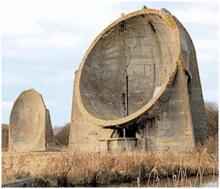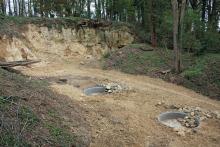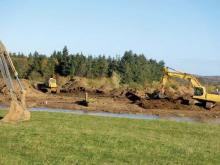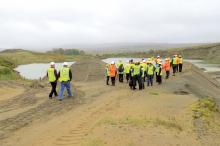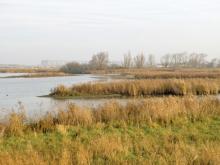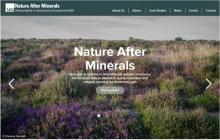Support for the
Now until June 2015, NAM (through the RSPB) will be one of seven partner organisations working across north-west Europe as part of a new project, whose aim is to engage in collaborative partnership working across a variety of stakeholder sectors around the minerals industry.
Named RESTORE, the new project aims to develop a framework for promoting the appropriate restoration of mineral sites to provide benefits for biodiversity, habitats and local people through cross-sector working and integration.
As a result, the project is also aimed at assisting with the economic and social cohesion of communities within this corner of Europe.
The project will operate with the RSPB (incorporating much of the NAM activity) working as the lead partner across the UK and liaising closely and cooperating with Surrey County Council, UK; VLM (the Flemish Land Agency); Limburg Province, regional government in the Netherlands; ILS, an economics institute based in Dortmund, Germany; ENCI Development Foundation (associated with the
The partnership will focus on four main areas of work: minerals policy (developing a best practice guide for north-west Europe); restoration (the piloting and demonstration of innovative methods); online interactive mapping (highlighting biodiversity resources to inform future minerals planning) and ecosystem services (assessing both the services which result from different restoration options and their value to communities within the north-west Europe region).
Future plans
In addition to the existing NAM team members, three new posts have been filled to cover key areas of the RESTORE project: a project coordinator based at the RSPB UK headquarters; an ecosystem services scientist based in the Midlands area of the UK and a restoration adviser based in Northern Ireland.
Work is underway to create a stylised logo and brand for the project and the Interreg IVB logo will sit alongside that of NAM and the RSPB.
Plans are also in place for the development of a dedicated website for the new project to keep all stakeholders and interested parties informed of the project’s aims and progress. It will offer advice and information on priority habitat creation; provide instances of case study best practice and develop an interactive mapping tool of mineral site potential to deliver for biodiversity and people throughout north-west Europe .
Programme mnager, Carolyn Jewell, said: “Recognition of the minerals industry’s position to deliver for nature on a potentially landscape scale has gathered apace these last few years.
“Support for the Nature After Minerals programme, from all stakeholders in the UK, to help turn aspiration into reality and keep the momentum moving forward, has meant that we can now share this model for successful partnership working with colleagues on the continent.
“We are truly thrilled to be able to work with new partners, to tap into the huge potential of mineral sites to link up and create priority habitats and support all nature in the north-west region of Europe as well as provide beneficial outcomes for local communities. We are particularly pleased to be working alongside colleagues at Surrey County Council in the UK, a long-time supporter and champion of NAM, as we look forward to embracing new challenges and developments over the course of the next two to three years.”
NAM intends to provide updates on the new project’s developments, as they occur, over the coming months, as will the RSPB.

